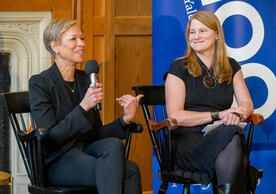
Award-winning filmmaker, author, and entrepreneur Tonya Lewis Lee recently engaged in a special centennial conversation with the Yale School of Nursing (YSN) midwifery faculty, tracing her journey in making the documentary film “Aftershock” about the Black maternal mortality crisis in the United States.
“It was a pleasure to visit The House and engage with YSN as part of their centennial celebrations,” Lee said after the event. “The Yale midwifery faculty and student midwives clearly care deeply about improving the rates of Black maternal and infant mortality. It will take purposeful effort from practitioners, educators, health science graduate schools, and beyond. I was glad to see the determination in the room from many disciplines and areas of study, eager to advocate and innovate for better outcomes for women’s health and that of their children.”
Assistant Dean of Yale College and Center Director Timeica E. Bethel-Macaire welcomed Lee and guests to the Afro-American Cultural Center, affectionately known as The House. It is the first such center at Yale and the first Black cultural center in the Ivy League.
Also participating in the conversation with Lee were members of the midwifery faculty. Assistant Professor in Nursing and Nurse-Midwifery Specialty Co-Director Joan Combellick ’91 MSN, PhD, MPH, MSN, CNM, FACNM; Helen Varney Professor of Midwifery Holly Powell Kennedy, PhD, CNM, FACNM, FAAN; Lecturer and Minority Student Coordinator Heather Reynolds ’80 MSN, CNM, FACNM; and Assistant Professor and Nurse-Midwifery Specialty Co-Director Michelle Telfer DNP, MPH, CNM, FACNM.
Early in her remarks, Lee described her family’s move from New Jersey to Wisconsin as an elementary schooler. In her new state, Lee encountered a culture of racist bullying from the students and a lack of protection from the teachers. She eventually left the school.
“What I think I’m trying do with the work that I’m doing is to fight for that little eight-year-old girl,” Lee said. “I think my work is about trying to make the world a better place so that other young people don’t have to go through that.”
Embarking on a Creative Life
A lawyer by training who clerked for the NAACP Legal Defense Fund early in her career, Lee yearned to engage in creative work. Her husband, Oscar-winning director Spike Lee, encouraged her to quit the corporate world and write full time.
The result was the 2007 children’s book “Please, Baby, Please,” and the publication’s success prompted the US Department of Health and Human Services to reach out and ask Lee to serve as a spokesperson for the Office of Minority Health’s infant mortality awareness-raising campaign “A Healthy Baby Begins with You.”
Lee said she didn’t realize the United States had such an issue with Black maternal mortality and infant mortality until she began traveling the country for the campaign. She learned that Black babies died at substantially higher rates than white babies, regardless of the Black mothers’ economic status.
“Once your eyes are opened in this way, once you have the opportunity to really get out in community and engage with people, it just becomes a part of you,” Lee said. “It certainly did for me.”
‘Aftershock’
Inspired in part by Linda Villarosa’s New York Times Magazine cover story, “Why America’s Black Mothers and Babies Are in a Life-or-Death Crisis,” Lee felt compelled to make a film.
“I thought to myself, ‘I better hurry up and make a documentary about this because I want to give my point of view on it before somebody else because I’m going to be really mad if somebody else does and they don’t do it right,’” Lee said.
Lee connected with her producing partner Paula Eiselt at a conference, and they began shaping “Aftershock.”
“We both had a shared vision about how this film, from our perspective, needed to be told. And that was by centering the women and centering the families in a way so that, first and foremost, you humanize the issue,” Lee said. “Because we often hear so much about the statistics and it’s just numbers. And so, we really wanted people to feel, as hard as it is, to feel what it means to lose a mother from childbirth complications.”
“Aftershock” follows the families of Shamony Gibson and Amber Rose Isaac as they connect with each other and fight for justice for the women, both of whom died from childbirth complications.
The film premiered at the Sundance Film Festival in 2022. It has since received numerous awards including a Sundance Special Jury Impact for Change Award, 2023 Peabody Award, an NIHMC Award, and a 2023 Emmy Award nomination.
‘How can this be?’
As Lee noted during the discussion, the infant mortality rate in the United States is going up. According to the CDC’s National Center for Health and Statistics, infant deaths have risen for the first time in 20 years and the rates among Black infants remain the highest.
“How can this be?” Lee asked. “How are we not as a nation be putting all of our resources into our people? We’re supposed to be the beacon for the world and yet we have these abysmal rates. And it’s solvable. It’s not like we can’t fix it—we can. If we choose to.”
Lee praised Yale midwifery students for their efforts. “I just want to really thank you for doing what you’re doing,” she said. “It’s really important work. Thank you for being here.”
Watch the Video
Watch the recording of the event, including the trailer for “Aftershock” and a Q&A with students, on the YSN YouTube channel. “Aftershock” is available for streaming on Hulu.
For more information on previous and upcoming YSN centennial events, please visit nursing.yale.edu/centennial.
